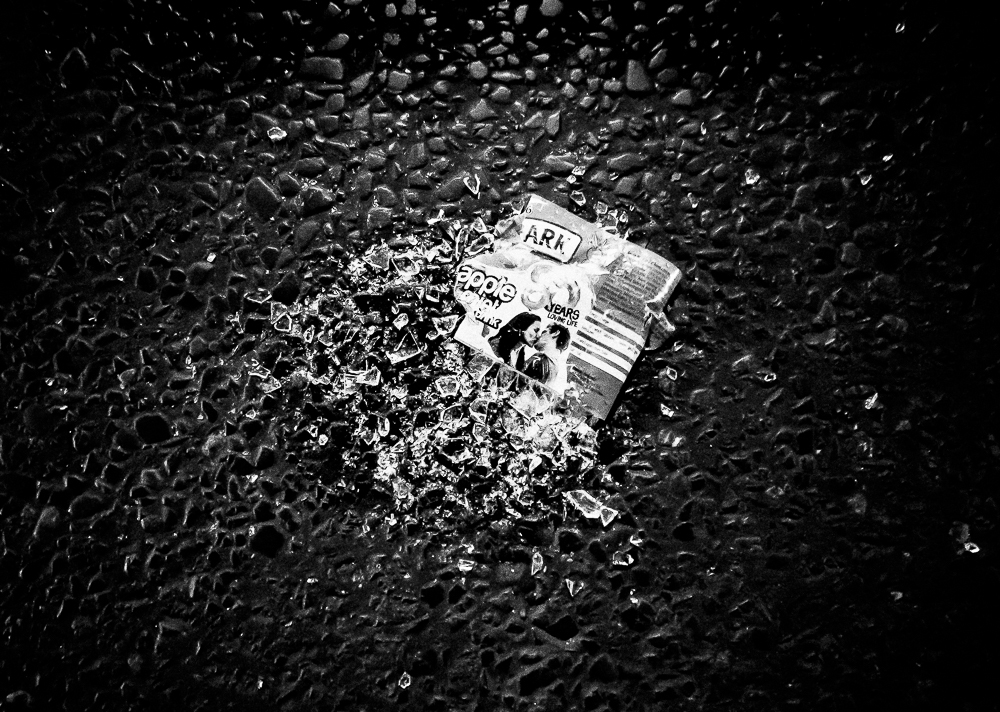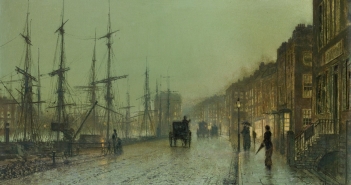“What face?” I said again. I wanted to help. I wanted more wine.
My flare-ups, real and imagined, may be related to all the drinking I do now. I think I drink every day, which seems shocking, until I try to conceive of getting through a whole day without drinking, which seems unfeasable. I handed Rebecca a glass.
“What face?” – for the fourth time. She kicked out her legs and threw her eyes to the ceiling, as though channeling spirits.
“The face you make when you go out,” she said. “The face that says you’re open for business. You were doing the face tonight. You made the face at every hot little thing who looked at you. You weren’t even discriminating. And don’t think this is me being jealous of them. I’m jealous of you. I used to make the face. But now I’m so fucking besotted and into you that I’m nothing. You’ve stolen my fucking wind. I don’t even exist anymore. You exist, and I don’t, so why don’t you go and exist and I’ll stay here in the void.”
The opera of it!
“Don’t find me amusing,” she said. “Just don’t.”
I thought to myself, be grave … and giggled. (Sometimes I giggle like a little girl. As I get older and more ogre-like the disjunct is starting to reek.) I took a breath, straightened my mouth to a slit. “You’re not nothing,” I said. Not in the way that the volume of wine in our glasses essentially counted as nothing. Experience told me that we’d be awake for two to four hours before we achieved a resolution to Rebecca’s face problem, or to whatever problem lay beneath the face problem, the face problem surely being only one tiny tile in the rich mosaic of her current problems. A bottle’s worth of problems. I wanted more wine. Should I go to the Indian on the corner? What was I saying?
“There’s another bottle in the fridge,” said Rebecca.
I subsided into the couch, my heart large with love. The wine could wait! I smothered Rebecca in kisses and endearments until she pushed me away.
“But how do I know that you love me?” she said. “I mean, where is it, this love?” She looked behind a cushion, under her feet. “And if I can’t make the fucking face, why can you make the fucking face if you’re so fucking besotted with me?”
She gets a potty mouth on her when she’s spoiling for a fight.
“I don’t know how you know,” I said. “When a relationship has lasted a while you just have to have faith that the love is there until you have proof that it isn’t.”
Rebecca doubled over and pretended to gag on the the word “relationship”. It occurred to me that I’d probably said that sentence before, possibly those exact words, and that she’d pretended to gag before as well. A certain level of self-parody was inevitable at this advanced stage of courtship, I told myself. Be sanguine. Do not despair. Have another drink.
Now she was crying. I stroked her between her shoulder blades. She mumbled. I asked her to repeat herself. She mumbled again, but I still couldn’t catch it, so I said loudly, “Baby, I’m sorry, I don’t know what you’re saying.”
“I said I don’t know what’s wrong with me!” she screamed.
Neither did I. There were too many possibilities. It could be work. I don’t really know what her work day is like, even though that’s where she spends the largest portion of her waking life. There’s a category in my brain for other people’s work lives, a purgatorial, limbo-like space into which they simply disappear for a set number of hours per day. As far as I’m concerned nothing of real consequence happens in work limbo (because nothing of real consequence happens where I work, except for counting the falling sand grains). Maybe she was being bullied in work? Maybe she had no work friends, and felt terribly isolated? Maybe it was the aggregate of stressors (and sand grains) that come with every job, beginning with getting out of bed in the morning?
Or maybe it was sex. Rebecca worries about sex all the time. She worries we don’t have sex often enough, worries that she doesn’t masturbate enough, doesn’t watch porn enough, doesn’t discuss sex enough, hasn’t slept with enough people, hasn’t seen and felt and sucked enough cocks, doesn’t really understand how to make other women orgasm, isn’t attractive enough, isn’t attracted to enough. She worries that her tits are falling. She worries that men sometimes reduce her to a talking pair of tits, and she worries that they don’t do it as much as in the good old days.
The temptation was to be chemically reductive and point out that we’d taken a variety of drugs for three days straight last weekend and had since been drinking even more heavily than usual to relieve the fear and the shakes and the vertigo. It’s just the drugs, I was going to tell her. And what if we are just the drugs and the drink? If you’re chemically altered all the time then isn’t altered the authentic ground of your being?
She had another problem now, because I resented her for involving me in her impossible sadness. I pulled myself into the farthest corner of the sofa and imagined being alone and free. Except I wasn’t alone in my imagination. Women softened the edges. There was a girl who’d been down at the festival with us during that three day binge, and there was another girl I kept seeing at the Shaw, a really sparky looking creature, probably a graphic designer or a photographer or something. She looked like she’d seriously consider a threesome.
My imagination, in other words, is a lazy moron, and didn’t bother filling in the girls beyond a few physical incidentals, this one’s bum, that one’s smile, so really I was on my own in the fantasy. Then I imagined life without Rebecca’s love. I would crawl through the limbo of a working day and then crawl home to a human rights violation of a one-bed flat, and I would drink endless cans of cheap beer instead of delicious relationship wine, and bunker down in a fortress of cans and porn and pizzas, and my remaining hair would succumb to scurvy, and I would see the promise of salvation in every new half-pretty creature, and I would throw myself at them with a frenzied (exhausted) air of lust and lovelessness.
“You should leave me,” said Rebecca.
“What?”
“I’m a nightmare. You should go and be free. You’d be happy if you were free.”
“No, I wouldn’t.”
“Yes, you would, you just never have been.”
“Bollocks. I’ve been free.”
“No, you haven’t. You’ve always had a girlfriend. It’s pathetic.”
“If I wanted to be alone I could be alone, I just don’t want –”
“Why are you so angry with me?”
“I’m not.”
“You are. You get so angry with me so quickly now.”
“I’m not angry.”
“I wish you’d stop being angry and just hit me.”
“You don’t want me to hit you.”
“I want to feel something!”
The possibility of violence squatted between us like a crocodile. Three feet of sofa cushion separated us, and I had to consciously engage all my muscles, a patient coming out of anaesthesia, to move across them and kneel above Rebecca. We stared hard at each other. Then I drew back my fist sharply, and she flinched and covered her face.
“No you don’t,” I said, and got off the couch to refill my glass.
I felt like I’d scored an important point with this demonstration, and tossed back my wine victoriously. It caught in my throat and I coughed. You can’t toss back wine.
The fundamental problem was that nothing bad had ever happened to Rebecca. Nothing bad could happen to people like us, in the world we lived in. It was just the drugs, the alcohol, the emotional incontinence. I was telling her this when a glass exploded beside my face.
Rebecca had hoisted herself up on the arm of the couch, her eyes all white like Goya’s Saturn. I felt a wet spot on my forehead and for a second thrilled to the notion that she had drawn blood. But it was just a splash of wine.
“You missed,” I said.
Rebecca launched herself from the couch with startling speed and landed a flurry of slaps and thumps on my shoulders and arms. I swatted most of them away and asked her to calm down. “You’ll only hurt yourself, baby, ” I said. She took a step back, gathered all of her detestation of me into her knuckly right fist, and smashed it into the side of my head. “Wow,” I said, cupping my ear. My vision swam blackly. She panted before me, her fingers still curled.
“Fight back!” she said. But I was so tired all of a sudden. It was three in the morning. The adrenaline of the fight was already souring. I shook my ringing head, backed away from her, and climbed the stairs.
What are you going to do about it, I asked myself as I took off my clothes. What are you going to do about it, as I got under the covers and laid my head on the pillow. What are you going to do about it, as I waited for the real girl to come up from the sitting room to terrorise me, and the nightmare girls to come up from my unconscious to smother me.
The nightmares had enveloped me the previous three nights, decomposing girls who pulled me into dark rooms and wrapped their rotting arms around my face. When I closed my eyes now they swam out of the blackness, and brought their rotting mouths towards mine to suck the air out of my lungs. My unconscious is a very literal spinner of symbols. He’s also a fucking charlatan. The girls didn’t look like Rebecca, or previous girlfriends, or my mother, or my manager, or anyone who might by usefully symbolized. They were just debt-collecting heavies sent by the drug fairy. I sank into the oily darkness and felt one of them at my back, tugging me. But it was only my lover.
“Forgive me.”
“What?”
“You have to forgive me.”
I rolled away from her. She was poking me in the shoulder, and I don’t think any human touch has ever been so abhorrant.
“Forgive me!” she said.
“All right, yes, you’re forgiven.”
“You have to mean it.”
“Jesus fucking Christ, I mean it, you’re forgiven, let me sleep.”
“You don’t mean it,” she whispered.
“You’re forgiven, okay? Now just let me go back to sleep.”
“No, I want you to talk to me.”
Roiling black fury swept away all higher mental processes like a hurricane through a hedge school. I didn’t have to talk. She poked me again and said, “Say something!” I threw the covers back and jumped out of bed.
“What are you doing?” she said, as I pulled on my boxers. “I’m leaving,” I said, spinning around the room looking for my jeans. My eyeballs throbbed and my vision was streaked and spotted (it felt like geysers of blood spurting from my brain). We grabbed my jeans off the floor at the same time, and as I tried to jab a foot through the waist she yanked on the legs. I stumbled backwards out of the jeans, bounced off the bed to right myself, and then tried to push past her to get out of the room.
“Don’t leave me!” she said, her voice high and hysterical.
“I’m not leaving you,” I said (I shouted), “I’m just getting out of this house.”
“Please don’t leave me,” she said (she cried). She had my right arm clasped between her hands. “Please, please don’t go,” she said, pulling my arm to her face, wetting my wrist with her tears. “Why won’t you just hit me?” she said.
I cradled her head in my hands like a coconut, or a melon, a beloved melon. Her eyes were moist and achingly blue in the light cast by a heavy wrought iron lamp we bought (she bought) at an antiques market one Sunday morning. One of those Sunday mornings. I could split her skull right down the middle with the butt of this lamp. I felt no scruples or squeamishness about the possibility of doing so. But I already knew what was inside. If I split it open no surprises would spill out.
Simon Ashe-Browne is a writer and script editor. His novel Nothing Human Left won the Dundee International Book Prize in 2011.
Feature Image: Daniele Idini




